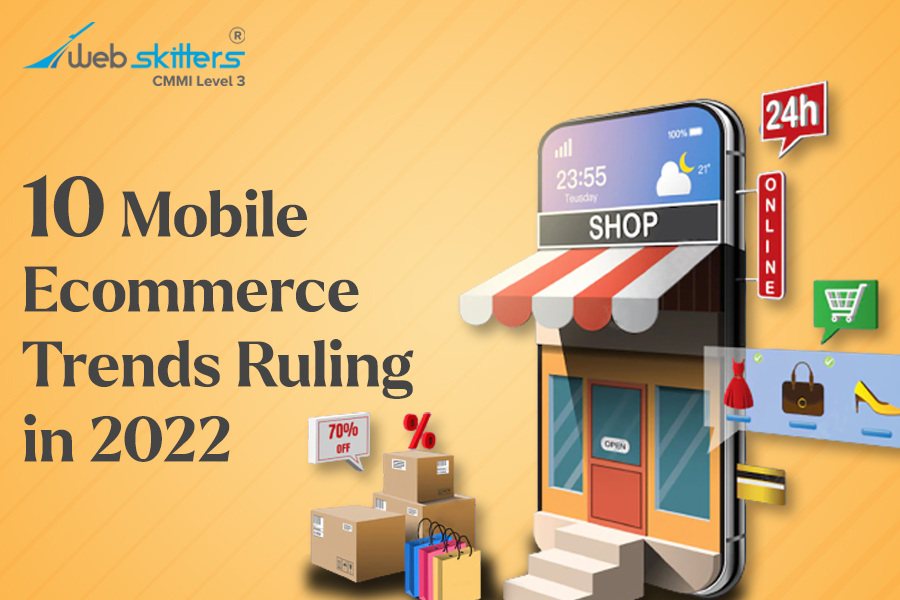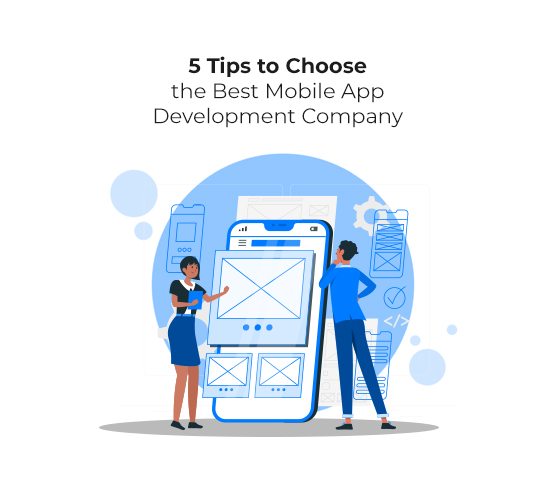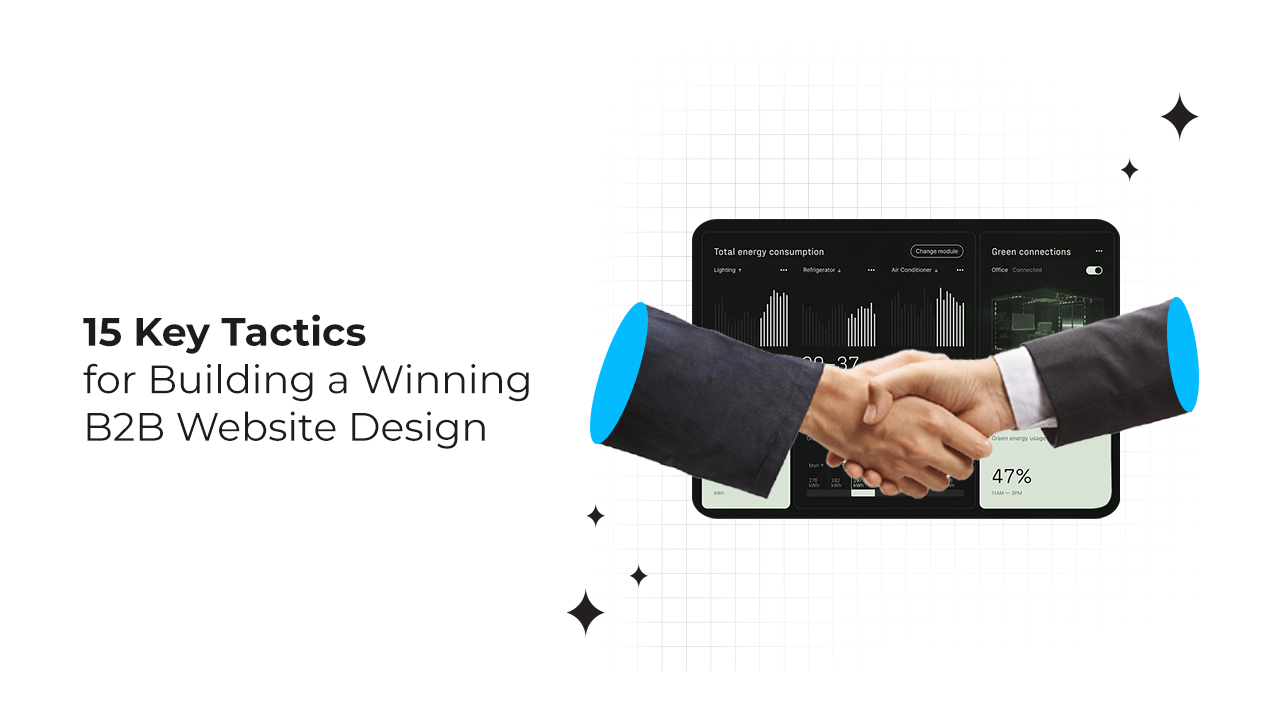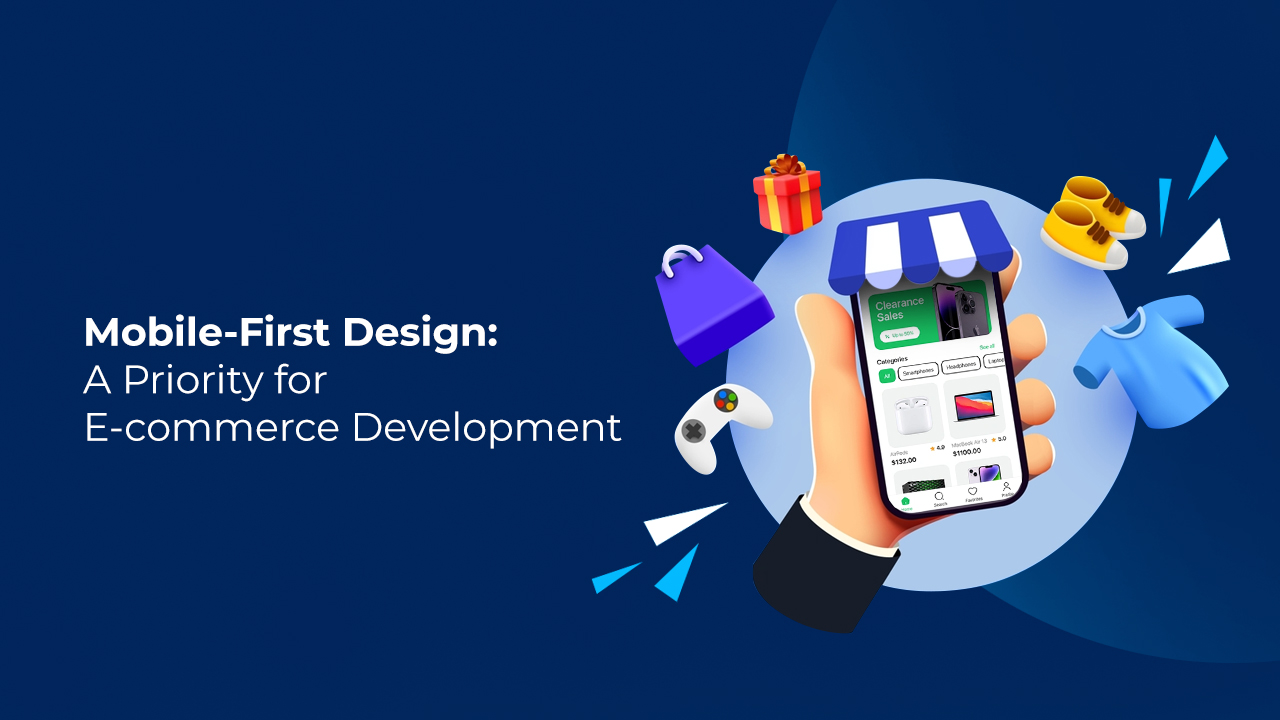
10 Mobile Ecommerce Trends Ruling in 2022
E-commerce is taking new heights over the past few years with some creative and innovative features in its website and apps. It isn’t shocking to know that many companies are delving deep into some major mobile commerce features as well. Seeing its demand rise every year, it’s best to expand the opportunities through mobile phones or tabs.
M-commerce, or mobile e-commerce, enables you to make purchases on your tablet or smartphone whenever and wherever you choose. Customers and companies can buy and sell items with the push of a button, thanks to advanced devices. Due to its subtle simplicity, mobile commerce has swiftly become a major eCommerce subcategory. And it makes sense because mobile devices are widely used, and their appeal is only increasing by the day.
With around 5.3 billion mobile internet customers, there were 7.2 billion smartphone users worldwide in 2021. It is anticipated that these numbers will continue to rise, even though the epidemic accelerated most of the mobile growth in the previous few years.
The top three nations with the highest number of smartphone users are the USA, China, and India. We credit the fast-rising selling price of mobile phones for the continued meteoric growth of the worldwide smartphone market revenue.
With the changed and rising online trends, it is logical for all to stay abreast of the most recent developments in the mobile commerce area. If you have an e-commerce store with all the mobile commerce features then you’re on the right track. Otherwise, you cannot overlook mobile customers while selling online using Shopify, WordPress, or other platforms.
The ten trends listed below will be prevalent in 2022, and they can help you gain profits, learn more about technology and make informed business decisions.
1. Augmented Reality
The fact that online purchasing doesn’t lend itself well to a truly immersive brand experience is one of the main problems with it. In a physical store, you can put clothing on, feel textiles, and judge for yourself how big the furniture seems in a room.
Although those things aren’t physically achievable in e-commerce, augmented reality (AR) apps provide a method to provide customers comprehensive and in-depth knowledge about your items – all from the comfort of their own homes.
Using Augmented Reality (AR) has proven to be a great way for consumers to virtually try on or explore the things they want to buy.
To make shopping better and more individualized, companies like IKEA are utilizing augmented reality to enable customers to use their smartphones to superimpose photos of its furniture catalog into their own living spaces.
IKEA is just one example that utilizes augmented reality to help people with mobile buying. Gucci, Wayfair, and Sephora have all made investments in augmented reality technology to offer amusement and motivation. The integration of online and offline buying is made possible by virtual reality, which also serves to enrich the online shopping experience.
Get this feature for your mobile commerce app to see a vast change in your business. When customers get a real-time feel while shopping, things change positively for any business.
2. Crypto Payments
Organizations may accept cryptocurrency payments from clients in return for goods and services thanks to crypto payment platforms. Given the nature of blockchain-based cryptocurrencies, these systems emphasize privacy and take payments from any nation.
Since cryptocurrency entered the mainstream last year, it has taken off significantly. Blockchain wallets are expected to displace conventional payment methods as cryptocurrency develops. Businesses are thinking more about including the feature in their m-Commerce apps to future-proof their selection as more customers get interested in cryptocurrency payments and the possibility to make frequent purchases via virtual currency.
In addition, cryptocurrency has support for QR codes, which simplify hassle-free immediate digital payments. Quick transactions, lower prices, privacy, and enhanced security are further factors drawing attention to this type of currency.
Therefore, including APIs from a reputable cryptocurrency service in mobile applications gives companies a safe and personalized wallet to seamlessly accept many currencies globally.
The future is changing rapidly given the diverse number of cryptocurrencies now available in the world. Bitcoin was the first cryptocurrency we knew, 10 years ago. Today, there are many more. Today, integrating this feature in the payment gateways will expand the horizons of businesses’ to manifolds.
3. One-Click Orders
Customers who purchase online must give important details about them and then continue shopping. Submitting the same data again can be frustrating and influence buying decisions.
It should come as no surprise that a lengthy checkout procedure causes numerous cart abandonments. Entering the same data like name, card number, expiration date, verification number, billing address, shipping address, and contact information can be too cumbersome to handle.
Due to the hassle of providing their important information on a small screen, the majority of shopping carts on mobile commerce apps are abandoned. Therefore, usability is crucial for a positive consumer experience.
By finishing the purchasing process with only a single click, one-click ordering with the M-commerce app gives clients the mental peace of hassle-free shopping.
The 1-click procedure on Amazon is a great example of this feature. It gives buyers the choice of adding an item to their cart or buying it right away by only entering their payment card information (the CVV number, more precisely). For the industry titan of e-Commerce, this function has changed the game.
Don’t let lengthy processes abandon the shopping experience entirely. Gain this feature for your online mobile commerce category so that the sales keep going up. Many software solutions companies offer this benefit for their clients’ online businesses, and you should have it too.
4. Voice Shopping
The newest trend in e-commerce today is voice shopping, which many people refer to as a branch of e-commerce. The brick-and-mortar establishments are facing fiercer competition from online commerce as consumers increasingly turn to the internet to buy everything from groceries to apparel. ECommerce sales are only increasing as we speak.
Voice shopping is creating huge and positive ripples across online stores. Were you aware that voice assistants and smart speakers like Google’s Siri and Amazon’s Alexa have been available since 2011? They are currently acquiring incredible momentum. Voice search is increasingly utilized for order placement, product research, and delivery tracking. Additionally, people are reading reviews, calling customer service, and placing new orders through it.
This is the reason brands must now include Voice shopping functionality in their mobile commerce applications. The majority of online shopping customers prefer voice purchasing due to its simplicity and ease of use hence, catering to their needs should be your priority.
With many of us getting used to this trend, new e-stores must include this feature for growth and swift shopping moments.
5. Chatbots
Have you noticed the mini chat boxes popping up on your phone screen when you visit a new website? For a while now, companies have used chatbots extensively. AI-based technology is developing swiftly. Sometimes, it may be exceedingly challenging to tell if you’re speaking with a real human or a machine-generated script in some situations.
The fact that chatbots function around the clock without needing a wage, 401(k) plan, or office space is a key benefit of utilizing them.
Consider this, chatbots will enable businesses to save customer assistance expenses annually by almost $8 billion by 2023. One software is all you need to have, instead of paying someone full-time to carry out the job a chatbot can do promptly.
Chatbots are frequently used to communicate with individuals via SMS text messaging or specialized applications. You can use it for a strengthened mobile commerce app by keeping this feature going. Many companies like Webskitters do it on a large scale for businesses. You can do it too.
6. Smart Personalization
Every company wants to know what their customers want and how they want it. This helps in a better client-company relationship. By adding smart personalization to the mobile commerce app, it will create a difference in revenue.
Personalized advertising aids in client retention. According to research, consumers prefer to make purchases from companies offering unique experiences. You can raise customer satisfaction by thoughtfully designed customization tactics, used with the appropriate consent for data usage.
Personalization may help brands concentrate on consumer behavioral segmentation and promote preference-based marketing. Brands may get contextual information about users, such as region and weather, by tracking the website browsing habits of their target market. This allows them to develop personalized messages for each customer. Data-driven custom communication increases the likelihood that a sale will be made since it allows businesses to ensure that every consumer is given the appropriate information at the right moment.
Online stores must focus on this aspect of mobile commerce trends to stay ahead of their competitors.
7. Advancing AI, Machine Learning, and Speech Recognition
Artificial intelligence (AI)-based voice recognition is computer software fueled by cutting-edge solutions like Machine Learning (ML) and Natural Language Processing (NLP). The AI system that analyses natural human speech is known as human language processing. The vocal data is first transformed into a digital format that can be processed by computer software. The digitized data is then subjected to further processing using ML, NLP, and deep learning techniques. Consumer products like smartphones, home automation, and other voice-activated technologies may then employ this digitized speech.
Machine learning and artificial intelligence are both continually evolving fields. This is evident on several eCommerce websites since they highlight the products you are most likely to purchase. As per searches and clicks, it frequently relates to upselling and cross-selling.
But AI is far more than just displaying items in an online marketplace. Businesses use it widely to power voice-responsive contact centers. The response that AI is receiving from the general customer base is one of the things that is advancing it. People still trust AI due to its advantages, despite the possibility of data loss. Some of the characteristics include faster processing than people, higher data storage and recall, and total cost savings.
If your e-commerce business has this feature already, you are moving in the right direction. For those who plan to start a new e-commerce business, get this mobile commerce feature for a feature-rich and vivid user experience.
8. Social Commerce
We all know how social media is impacting the world in different ways. One of them is the e-commerce businesses that have taken over these platforms astoundingly.
Brands are utilizing social media to increase brand recognition and generate leads. The rise of social commerce can be attributed to the fact that it is normal for firms to use social media for marketing and direct sales.
Due to the widespread use of visual social media sites like Instagram, Facebook, and TikTok, and the simplicity of conversions on these sites, social commerce has tremendous potential. Particularly, Instagram and Facebook now feature posts with convenient shopping options. Each image can have product tags added by brands, and you can use these tags to create clickable, user-friendly connections.
Shoppers may thus use their mobile devices to access social media networks and shop for their preferred companies all in one spot. One platform that has worked very closely with companies to provide customizable stores with highlighted products and easy shopping is Instagram Shops. You will notice how they have collaborated with brands and how simple it has become to buy online.
9. Mobile Fraud
Sadly, with increasing internet security threats, everyone is now really concerned about cybercrime. Customers are highly reluctant to divulge data to third parties that don’t have a solid reputation as a reliable brand.
Small boutique eCommerce companies may run into issues because of this. A consumer can feel more at ease purchasing from a name they are familiar with if you are providing goods that are comparable to those of well-known brands. Because of this, every e-commerce company needs to avoid fraud across all platforms, including mobiles. Around 65% of fraudulent transactions come from mobile devices.
It makes it reasonable that phone fraud would rise along with mobile usage, which has been rising over time. Although no individual or company is ever completely safe against fraud, there are precautions you may do to avoid it.
The first step is to build a smartphone e-commerce application for your shop. Apps are less vulnerable to regular mobile web browser threats like phishing scams and other conventional attacks. An app’s anatomy is safer by nature.
According to what we previously mentioned, clients won’t need to manually input their payment details for every purchase. To safeguard it from a potential compromise, an app can securely store all client and payment details.
As an extra layer of security, apps may configure security measures like two-factor verification. Customers will search for the safest method to purchase online as cybercrime keeps rising. A mobile app is safer than a mobile web browser.
10. Omnichannel Mobile Shoppers
Both mobile web and apps are now essential components of the shopping process. Mobile applications, on the other hand, are in a position to do more to drive the in-store and omnichannel experience thanks to the strength of integration, deeper analytics, and more powerful technology.
Omnichannel retail, where consumers have numerous options for purchasing from a specific brand or retailer, has long been a significant buzzword, but an omnichannel tactic has become a requirement during the Covid-19 pandemic and its many interruptions to businesses. It is in the best interest of brands and merchants to provide their audiences with a variety of purchasing options that meet their demands when customers start to leave the house once more.
However, mobile devices and applications can and should play a vital role in a strong omnichannel consumer experience irrespective of what a company’s primary sales channels may now be. Mobile has several additional effects on customer journeys in addition to being a purchase channel in and of itself.
Omnichannel retail, simply put, is the technique of marketing things over several platforms. Here, diverse mediums might include a physical store, a smartphone app, and an e-commerce website. When’s the last time you made an impulsive internet purchase? Most of the time, you probably knew in advance what you intended to purchase.
Owners of e-commerce businesses must understand that consumers get information about products from a variety of sources before making a purchase. If you own a physical business, the in-person experience may alter how customers shop online. Consumers demand similar shopping experiences across all channels because 73 percent of them use several channels.
Additionally, many are ready to change brands if they aren’t receiving a steady omnichannel experience from one business. For those with physical and online stores, you have to create better strategies to treat customers equally. You need to take this step and make a difference.
The Booming Mobile Commerce
The online industry is predicted to grow as mobile device integration continues worldwide. Mobile commerce is the most convenient and efficient shopping process for customers who prefer to shop online, from wherever they are, simply by tapping the screen of their device.
Therefore, brands that stay updated with Mobile commerce trends are those best-placed to offer the finest user experience and support customer loyalty. Implementing ecommerce strategy can help in ROI.
If you want your business to succeed in today’s economy, you’ll need to consider your adaptations to get customer engagement. Otherwise, you will hand over potential buyers to competitors.
Presently, if you have an online store, mobile commerce is one such category you should not ignore at any cost. Renowned firms like Webskitters can do a perfect job for you when it comes to integrating the latest features for your suave online store.

 Ecommerce Development
Ecommerce Development 













